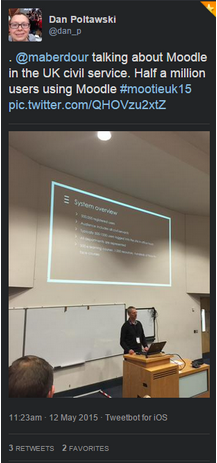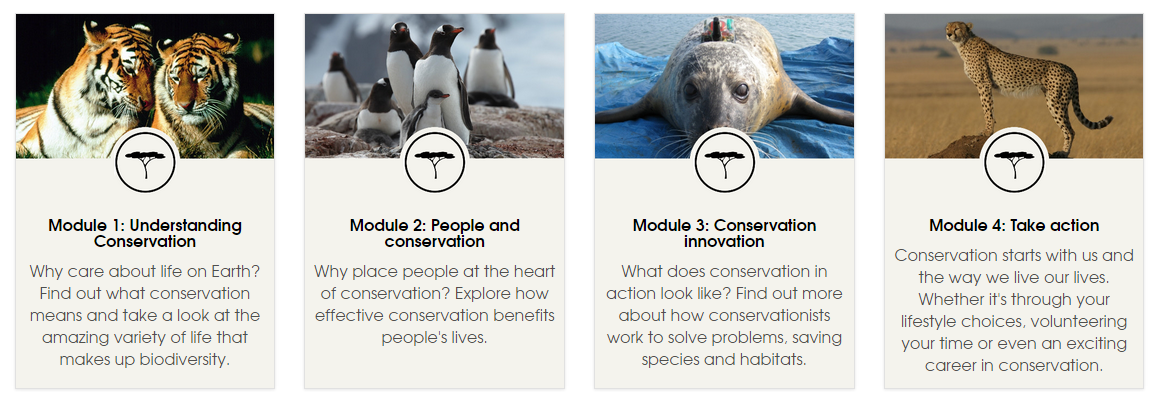Reading Time: 5 minutes
This year was my fourth Moot and it was another cracking event. Dublin is a welcoming and accessible location so it was good to be back here. I attended the two conference days on May 12-13, but the conference was topped and tailed by a workshops day on the 11th and a developer hackfest on the 14th.
First ever workplace learning stream
Of particular interest for me was that for the first time the conference featured a workplace learning stream. Despite Moodle topping multiple surveys of the the most widely used workplace LMSes, previous Moots have typically been dominated by the education sector. It’s great to see the focus gradually shift and the conference become more representative of real world Moodle users. It was nice to hear Moodle HQ presenters reinforce that future Moots would be structured along similar lines.
The workplace stream consisted of case studies from:
- Civil Service Learning
- University Hospital Southampton
- Health and Safety Authority
- An Irish law company
- A US Healthcare company
There was also a good analysis of the business impact of long term support vs yearly upgrades from the conference organiser, Gavin Henrick. The workplace stream was well attended, and I look forward to more of the same in future years!
LEO/ CSL presentation

This was LEO’s first year at MoodleMoot with the new name, previously we have attended and sponsored as Epic. But it’s essentially our fourth year of attending and this year we participated in one presentation on running Moodle for half a million users at Civil Service Learning, a Moodle/Drupal based portal for all UK government employees. The session focussed on three main areas: site architecture and hosting infrastructure, incremental improvement of an inherited live site and our work on a competency self assessment tool built using Moodle’s Questionnaire plugin. People were engaged and asked plenty of questions afterwards, particularly around social learning. Slides are at online over at Slideshare.
LEO infographic poster
We also submitted an entry to the poster display: an infographic about supporting the 70:20:10 learning framework with Moodle. This was prominently displayed on the coffee/exhibition/networking area. One of the benefits of Moodle in the workplace is that it is so much more than a traditional LMS. Moodle was created as a collaborative learning system, long before the term ‘social learning’ became popular. We know that most learning in the workplace is done informally, so we focused the infographic on how Moodle can be used to support the 70:20:10 learning framework (whereby 70% of learning is through experience, 20% through other people and 10% through formal, structured learning). It’s very workplace focussed hence many of the academics at the Moot were unaware of the term, but it’s based on several decades of solid research and generated some good conversations. You can see it on the LEO blog, it’s under Creative Commons so please take it, use it, share it, pin it, etc!
Learning Analytics
So this was probably the big theme of the Moot this year. Dr Bart Rienties, Programme Director of Learning Analytics from Institute of Educational Technology at Open University, did the opening keynote on day 1. He demonstrated a fantastic recommendation engine for the OU Moodle, which applies machine learning techniques on the VLE and learner demographic data to offer up personalised learning opportunities to students, with the aim of increasing student success rates. This was fascinating because your average corporate Enterprise LMS needs just this kind of personalised turbo-charging! It was great to see what the world leaders in learning analytics are up to. Bart’s keynote slides are up on Slideshare and more detail of OU’s machine learning recommendation engine is available on the OU Analyse project website.
Analytics and personalisation has been a buzzword for a while, but there was a maturing view this year that learning analytics is still young and experimental, and is VERY hard to do well. But there is a thirst to understand how it can applied in Moodle and to see case studies of learning analytics being applied in practice.
Other sessions of note
For the first time we had a LEO client presenting this year. Nick Lee from University Hospital Southampton ran a well attended and very well received session about his Moodle implementation. Nick has already blogged about his experience.
The United for Wildlife MOOC theme made a BIG splash. They have transformed the Moodle interface with clean and slick theme. See it live at http://learn.unitedforwildlife.org/ and their slide deck is also online at, you guessed it, Slideshare.

Digital badges are clearly coming of age. Last year people were learning about them, this year people are doing case studies of how they use them. The Irish Health and Safety Authority presentation showed a really slick implementation of their badge system. There is some good info on their badge programme on their website.
Moodle Association setup
Martin Dougiamas did the closing keynote on Day 1. The main talking point was the setup of the Moodle Association, which will take membership subscriptions from supporting individuals and organisations as a way of funding future Moodle core development. The idea apparently came from last year’s donations round, which many universities wanted to donate to but were prevented from due to their charitable status. It turned out that while they cannot actually make donations, they can pay to JOIN things. Hence the Association.
It is HQ’s intention to move from 30 to 100 development staff (a great ambition in my view, but still smaller than many LMS dev teams), and they see the Association as a way of raising funds to do this. It wasn’t lost on me that they could also expand the Moodle Partner model to achieve this , which is very closed to a small number of partners and not accepting new partners in busy regions like the UK, regardless of merit or size of market. There will however be rules about the types of organisations who can become Association members, it is not an alternative to Partnering for example, and the two programmes will run concurrently. The Association had a mixed response from people I spoke to, it will be interesting to see where it goes, but it sounds broadly positive and I’ll certainly be down for an individual membership. More info at http://moodleassociation.org/
The Moot is always great fun, and for me represents possibly my main learning and development activity for the year. There is just so much on offer from case studies and plugin demos to technical sessions and informative keynotes, not to mention the networking. I went to fewer technical sessions this year but possibly learned more than any other year. The conference streams format worked well and the Dublin City University venue was great. Many thanks to all the organisers and sponsors who made this such a super event!
Pingback: UK & Ireland Moodlemoot 2015 – Some blog posts | Some Random Thoughts